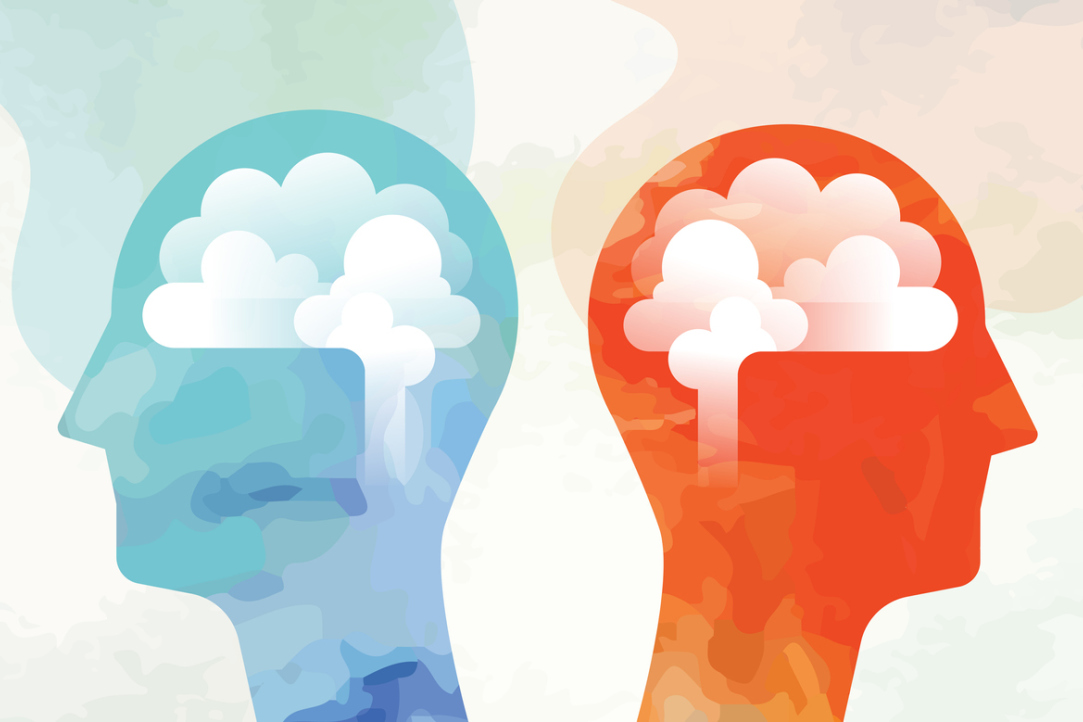Can the Brain Resist the Group Opinion?

Scientists at HSE University have learned that disagreeing with the opinion of other people leaves a ‘trace’ in brain activity, which allows the brain to later adjust its opinion in favour of the majority-held point of view. The article was published in Scientific Reports.
We often change our beliefs under the influence of others. This social behavior is called conformity and explains varios components of our behaviour, from voting at elections to fashion trends among teenagers.
Brain research has recently well informed about short-term effects of social influence on decision making. If our choice coincides with the point of view of the people who are important to us, this decision is reinforced in the brain's “pleasure” centres involved in the larger dopaminergic system responsible for learning, motor activity and many other functions. Conversely, in instances of disagreement with others, the brain signals that a ‘mistake’ has been made and triggers conformity.
However, there is little study of how social influence affects brain activity once some time has passed after we have formed an opinion and learned of the opinion held by others. HSE neuroscientists decided to study whether the opinion of others causes long-term changes in brain activity. The scientists used magnetoencephalography (MEG), a unique method that allows you to see in detail activity of the human brain during information processing, and it has a temporal resolution higher than that of traditional fMRI.
At the beginning of the experiment, 20 female participants rated the degree to which they trusted strangers whose faces were depicted in a series of photographs. They then were informed about the collective opinion of a large group of peers on whether to trust these strangers. Sometimes the opinion of the group contradicted the opinion of the participants, and sometimes it coincided with it. After half an hour, the subjects were asked to reassess their trust to the same strangers.

HSE University Professor Vasily Klucharev, one of the authors of the study
‘Our study shows the dramatic influence of others’s opinion on how we perceive information. We live in social groups and automatically adjust our opinions to that of the majority, and the opinion of our peers can change the way our brain processes information for a relatively long time.’
The study showed that the participants changed their opinion about a stranger under the influence of their peers in about half of the cases. In addition, changes occurred in their brain activity: scientists discovered ‘traces’ of past disagreements with peers. When the subjects again saw the face of a stranger, after a split second, their brain signaled that last time their personal opinion did not coincide with the assessment given by their peers. Most likely, the fixation of this signal allows the brain to predict possible conflicts in the future arising from disagreements in order to avoid them, and this probably occurs subconsciously.
It is interesting that an area such as the superior parietal cortex, an area of the brain responsible for retrieving memories, is involved in coding the signal of past disagreements with the group. It is likely that the faces of strangers, about whom the brain encountered a difference of opinion, are remembered better than others.
Thus, the opinions of others not only influence our behavior, but also cause long-term changes in the way our brains work. Apparently, the brain not only quickly adjusts to the opinions of others, but also begins to perceive information through the eyes of the majority in order to avoid social conflicts in the future.

Aleksei Gorin, a PhD student at HSE University
‘It was very interesting to use modern methods of neuro-mapping and to see traces of past conflicts with the opinion of the group in the brain’s activity. The brain absorbs the opinion of others like a sponge and adjusts its functions to the opinion of its social group.’
Aleksei Gorin
Junior Research Fellow, International Laboratory of Social Neurobiology
Vasily Klucharev
Director of the Institute of Cognitive Neuroscience
See also:
Scientists Find Out Why Aphasia Patients Lose the Ability to Talk about the Past and Future
An international team of researchers, including scientists from the HSE Centre for Language and Brain, has identified the causes of impairments in expressing grammatical tense in people with aphasia. They discovered that individuals with speech disorders struggle with both forming the concept of time and selecting the correct verb tense. However, which of these processes proves more challenging depends on the speaker's language. The findings have been published in the journal Aphasiology.
Scientists Discover Link Between Brain's Structural Features and Autistic Traits in Children
Scientists have discovered significant structural differences in the brain's pathways, tracts, and thalamus between children with autism and their neurotypical peers, despite finding no functional differences. The most significant alterations were found in the pathways connecting the thalamus—the brain's sensory information processing centre—to the temporal lobe. Moreover, the severity of these alterations positively correlated with the intensity of the child's autistic traits. The study findings have been published in Behavioural Brain Research.
HSE Researchers Discover Simple and Reliable Way to Understand How People Perceive Taste
A team of scientists from the HSE Centre for Cognition & Decision Making has studied how food flavours affect brain activity, facial muscles, and emotions. Using near-infrared spectroscopy (fNIRS), they demonstrated that pleasant food activates brain areas associated with positive emotions, while neutral food stimulates regions linked to negative emotions and avoidance. This approach offers a simpler way to predict the market success of products and study eating disorders. The study was published in the journal Food Quality and Preference.
HSE Neurolinguists Create Russian Adaptation of Classic Verbal Memory Test
Researchers at the HSE Centre for Language and Brain and Psychiatric Hospital No. 1 Named after N.A. Alexeev have developed a Russian-language adaptation of the Rey Auditory Verbal Learning Test. This classic neuropsychological test evaluates various aspects of auditory verbal memory in adults and is widely used in both clinical diagnostics and research. The study findings have been published in The Clinical Neuropsychologist.
Researchers at HSE Centre for Language and Brain Reveal Key Factors Determining Language Recovery in Patients After Brain Tumour Resection
Alina Minnigulova and Maria Khudyakova at the HSE Centre for Language and Brain have presented the latest research findings on the linguistic and neural mechanisms of language impairments and their progression in patients following neurosurgery. The scientists shared insights gained from over five years of research on the dynamics of language impairment and recovery.
Neuroscientists Reveal Anna Karenina Principle in Brain's Response to Persuasion
A team of researchers at HSE University investigated the neural mechanisms involved in how the brain processes persuasive messages. Using functional MRI, the researchers recorded how the participants' brains reacted to expert arguments about the harmful health effects of sugar consumption. The findings revealed that all unpersuaded individuals' brains responded to the messages in a similar manner, whereas each persuaded individual produced a unique neural response. This suggests that successful persuasive messages influence opinions in a highly individual manner, appearing to find a unique key to each person's brain. The study findings have been published in PNAS.
'We Are Creating the Medicine of the Future'
Dr Gerwin Schalk is a professor at Fudan University in Shanghai and a partner of the HSE Centre for Language and Brain within the framework of the strategic project 'Human Brain Resilience.' Dr Schalk is known as the creator of BCI2000, a non-commercial general-purpose brain-computer interface system. In this interview, he discusses modern neural interfaces, methods for post-stroke rehabilitation, a novel approach to neurosurgery, and shares his vision for the future of neurotechnology.
Humans, Bots, and Digital Twins: Year-End Results of the Strategic Project 'Human Brain Resilience'
HSE University hosted a joint research seminar to review the 2024 results of the Strategic Project 'Human Brain Resilience: Neurocognitive Technologies for Adaptation, Learning, Development and Rehabilitation in a Changing Environment.' The event showcased the progress and outcomes of fundamental and applied projects focused on developing technologies for neurodiagnostics, neuroadaptation, and neurorehabilitation—collectively known as 3N technologies. The objective is to develop tools that can help prevent neurogenic and psychiatric disorders or alleviate their consequences.
Smoking Habit Affects Response to False Feedback
A team of scientists at HSE University, in collaboration with the Institute of Higher Nervous Activity and Neurophysiology of the Russian Academy of Sciences, studied how people respond to deception when under stress and cognitive load. The study revealed that smoking habits interfere with performance on cognitive tasks involving memory and attention and impairs a person’s ability to detect deception. The study findings have been published in Frontiers in Neuroscience.
'Neurotechnologies Are Already Helping Individuals with Language Disorders'
On November 4-6, as part of Inventing the Future International Symposium hosted by the National Centre RUSSIA, the HSE Centre for Language and Brain facilitated a discussion titled 'Evolution of the Brain: How Does the World Change Us?' Researchers from the country's leading universities, along with health professionals and neuroscience popularisers, discussed specific aspects of human brain function.


